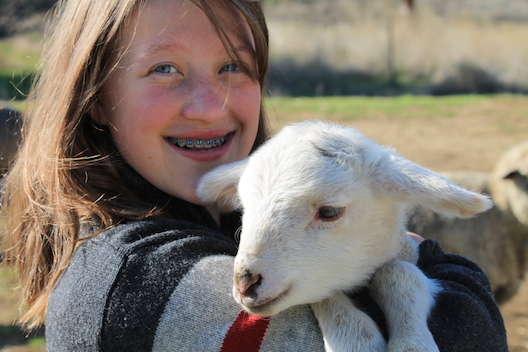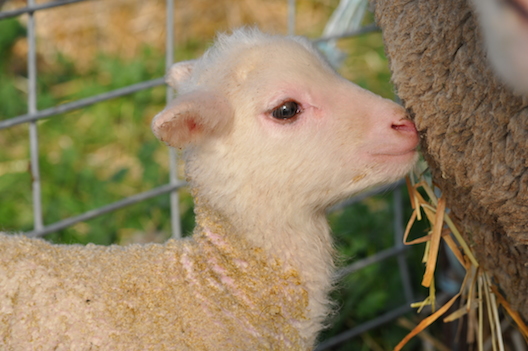Lambing Season
To all of you who have chosen to be Full Belly Farm CSA members, I imagine that at least part of that decision resulted from you thinking that our farm is somehow more just or fair than most other farms. However, if I asked you “What is justice?” I imagine very few people would be able to readily answer that question. And how can we say that Full Belly is more just, if we don’t even know what we are talking about?
I don’t have the answers to any of life’s biggest questions for you (at least not this week), but the farm has provided an excellent space for thinking about these questions in brand new contexts for me. One of my projects in particular, bottle-feeding our bummer lambs, has brought up a multitude of moral questions for me. For those of you who don’t know, bummer lambs are what we call the lambs that the mother ewes reject. I have bottle fed our 9 bummer lambs, 3 times a day for several weeks, which has given me a lot of time to think about the project. Here are some of the questions I have been wrestling with:
Was domestication moral? Is it moral to take away a species ability to fend for itself and make them dependent? Does it change your answer if they are being put to really useful tasks, like mowing and fertilizing, which would otherwise be done with diesel machinery? If it was immoral than what should be done with domesticated animals today? Should we simply stop breeding them? Would erasing domesticated animals from existence erase the crime?
Given the fact of domestication, and that I am right now responsible for 9 newborn creatures who need me to feed and protect them, what is the best way to proceed? Must they be kept behind a fence, with me in complete control of all the resources they need, on the other side of the fence? If the fence is necessary for their own safety, than what is the best way to feed them given that there are 9 of them and that I only have two hands. I think it would be useful to illustrate what has ended up happening without my really thinking about it. Because of natural variation some of the lambs are bigger and stronger than the other lambs. If you try to feed the smaller ones before the bigger ones the bigger ones will keep knocking them out of the way. However, if you feed all the biggest ones first, by the time you get to feeding the smaller ones, who also tend to drink slower, the bigger ones will be ready to bother the smaller ones again. So what ends up working best, for you as the feeder, is to feed the very biggest, then the very smallest, then the next biggest, then the next smallest, always saving the ones in the very middle for last. I have thought seriously about taking each lamb out and feeding him or her individually, in an arbitrary order each meal, but then I start thinking about whether it would be ethical as an hourly wage earner to spend so much time on what others might consider such a simple task. And then I start to think about the ethics of the employee-employer relationship, which is some really dangerous thinking, especially if one has just been thinking about the ethics of domestication, dependency, and how to create systems to make sure that everyone gets fed fairly.

But I digress. My goal here wasn’t to share answers, but to share questions. Being a member of a CSA, as the first letter suggests, is about being a part of a community. One of the best ways to deepen community is to create common conversations within that community. So this week, as you are sitting down with your family to enjoy some of this delicious box of produce, I would like you to discuss some or all of the questions that have occurred to me while I have been feeding the bummer lambs, and what, if any, implication the answers to those questions have for how we should go about feeding everyone in our human society? And if you happen to come up with a better system for feeding the lambs while doing so please let us know!
— Sam Schwartz, Intern

